Key takeaways:
- Understanding the emotional dynamics of difficult conversations facilitates better communication and empathy.
- Anti-war activism highlights the human impact of conflict and fosters community and solidarity among diverse individuals.
- Effective dialogue requires active listening, respect, and a calm demeanor, enabling productive exchanges even in heated discussions.
- Sharing personal experiences can humanize conversations, encouraging vulnerability and deeper connections among participants.
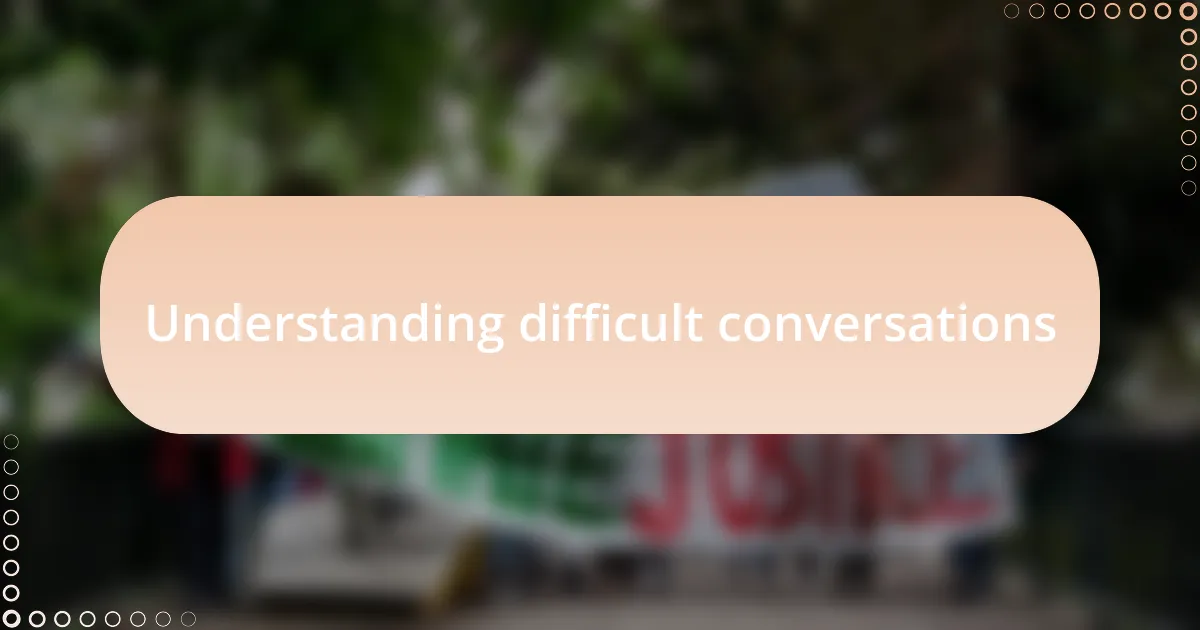
Understanding difficult conversations
Difficult conversations are those moments that can fill us with anxiety, yet they are also opportunities for profound growth. I still remember my first heated discussion about war with a friend who had a family member deployed. It was an emotional rollercoaster—every word sparked tension, and I could feel the stakes rising. It made me realize that understanding the emotional currents in these conversations can help us navigate them more effectively.
Have you ever found yourself trying to articulate your beliefs while sensing the discomfort in the air? I recall a time when I mentioned my anti-war stance at a family gathering, only to be met with silence and sideways glances. It was eye-opening for me; I learned that emotion often outweighs logic in such discussions. Observing those reactions taught me the significance of empathy, as it became clear that the conversation was not just about exchanging ideas, but about understanding deeply held fears and values.
These conversations often reveal our vulnerabilities and highlight our societal divides. I think about the weight of those exchanges—the shared struggles and differing perspectives make them more than just debates. They challenge us to stand firm in our beliefs while also opening our hearts to listen. How do we find that balance between advocating for change and respecting differing views? Navigating this terrain requires patience, active listening, and a willingness to embrace discomfort.
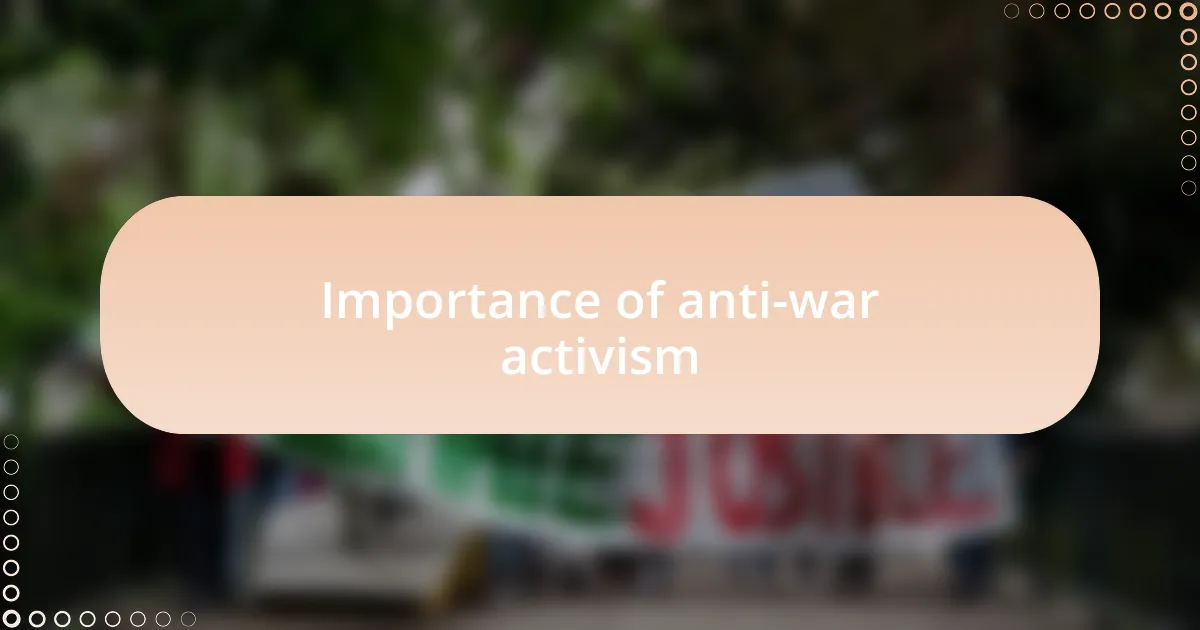
Importance of anti-war activism
Anti-war activism is crucial because it serves as a voice for those who are affected by conflict but often go unheard. I remember attending a rally where a veteran shared his harrowing experiences and the toll war took on his mental health. Hearing his story reinforced my belief that activism isn’t just about politics; it’s about human lives and the narratives we must elevate.
Being involved in anti-war activism has taught me that such efforts can foster community and solidarity. At one protest, I connected with individuals from diverse backgrounds, all committed to ending violence. It was powerful to witness how shared ideals can bridge divides and create a sense of belonging, reminding us that we are not alone in our pursuit of peace.
Moreover, anti-war activism raises critical awareness about the real costs of war—not just in terms of lives lost, but also in terms of resources and social cohesion. Have you ever wondered how many other pressing issues could be addressed if we redirected our focus and finances from military efforts to social programs? This shift can lead to a healthier society where compassion and understanding take precedence over conflict.
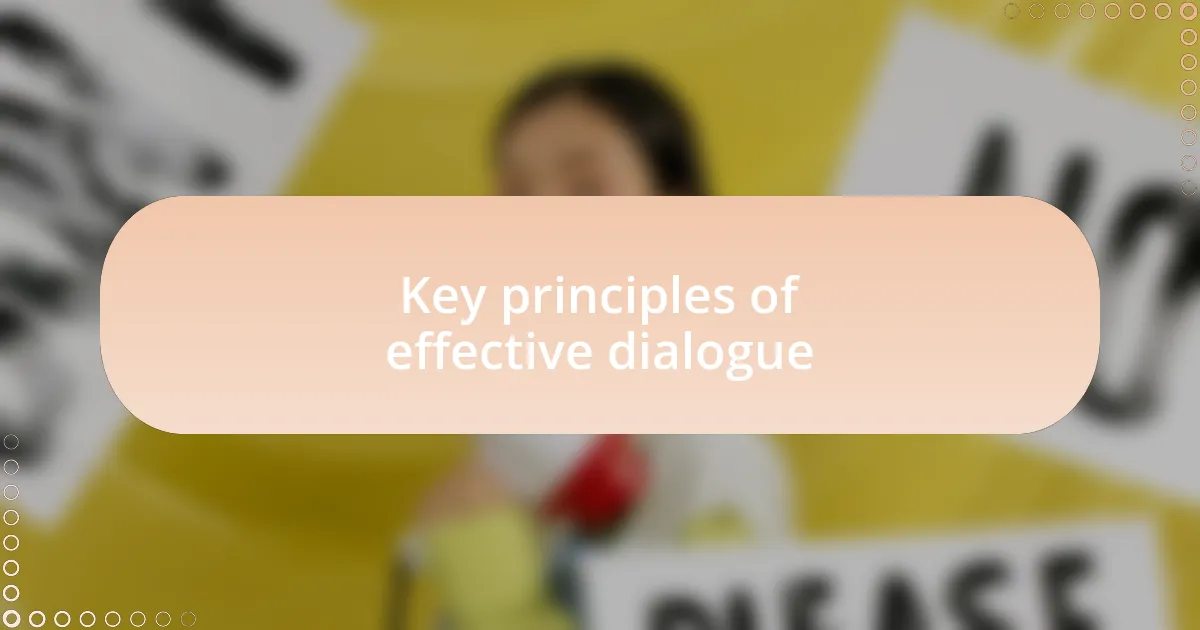
Key principles of effective dialogue
Effective dialogue hinges on active listening, which means truly hearing what the other person is saying without preparing your rebuttal in your mind. I recall a moment in a heated discussion about military interventions where I chose to pause and reflect on my conversation partner’s perspective. That decision opened the door to a more meaningful exchange, allowing me to empathize rather than react impulsively.
Another key principle is to communicate from a place of respect and curiosity. I often find that asking open-ended questions not only invites the other person to share their thoughts but also fosters an atmosphere of trust. For instance, during a community meeting, I asked a fellow activist about their experiences with war, which led to a profound conversation that deepened our understanding and collaboration.
Moreover, it’s essential to remain calm and composed, even when emotions run high. I once found myself in a situation where tensions escalated due to differing views on war policies. By consciously choosing to maintain my composure and addressing the topic with clarity and respect, I managed to steer the conversation back to productive ground rather than letting frustrations take over. This approach often yields better outcomes and encourages others to engage meaningfully.
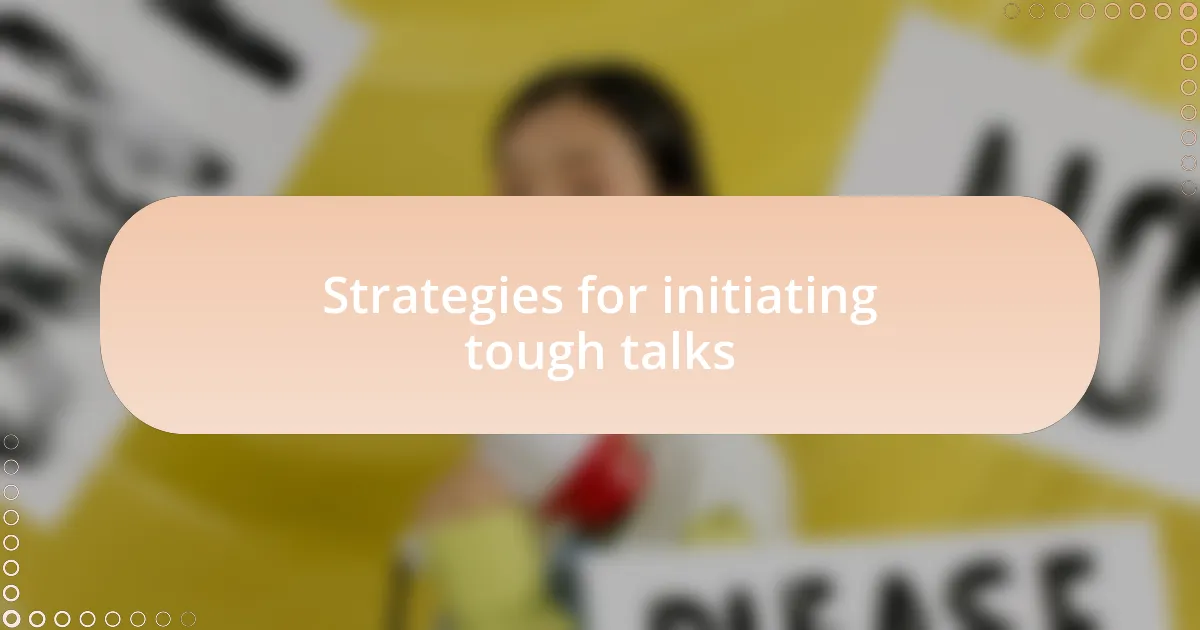
Strategies for initiating tough talks
One strategy I’ve found effective is to establish a common ground before diving into tough topics. I remember a discussion about military spending where I started by acknowledging our shared desire for peace and security. This foundation created a conducive atmosphere, making it easier to navigate through the difficult aspects of the conversation without feeling adversarial.
Another tactic is to set the right tone at the outset. When I recently broached the subject of historical injustices in a gathering, I made it clear that my aim was not to blame but to understand. By framing the conversation in this way, I noticed others were more willing to engage and share their stories, which enriched the dialogue and deepened our collective insight.
Timing can be everything, too. There have been moments when I’ve sensed the mood in a room was a bit off—perhaps it was too charged or distracted. Choosing to wait for a more opportune moment often led to much more fruitful conversations later on. Reflecting on these experiences, I wonder: has there been a time when you felt the moment was just right to discuss something sensitive? Trusting your instincts about timing can transform a tough talk into a meaningful exchange.
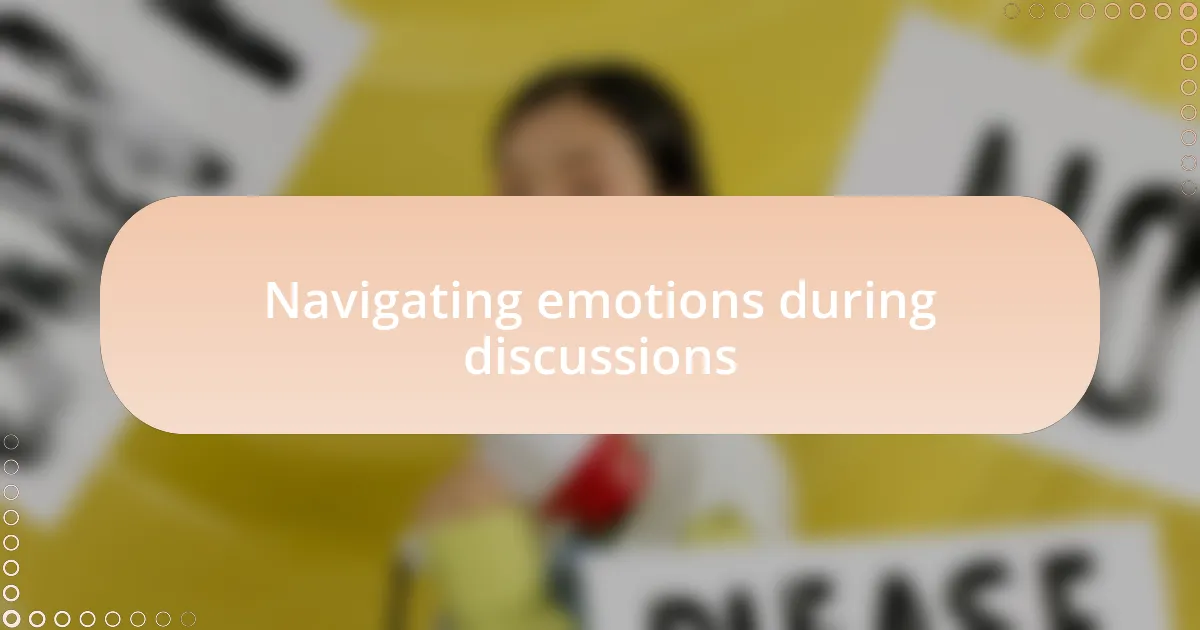
Navigating emotions during discussions
When navigating emotions in discussions, I often find it vital to actively listen. There was a time during a heated conversation about military interventions when I paused to truly hear the fears of others in the room. I realized that acknowledging these emotions, rather than dismissing them, opened the door for more genuine connections and deeper understanding, making the air feel less charged and more collaborative.
I’ve also discovered the power of sharing my own vulnerabilities. In a dialogue about the ramifications of war on civilians, I spoke about my discomfort with violent imagery in media. By expressing this personal struggle, I noticed others began to peel back their own layers, leading to a more heartfelt exploration of our shared humanity. Isn’t it fascinating how vulnerability can be a bridge rather than a barrier?
Emotions can sometimes run high, and I have learned to stay patient when tensions rise. I recall a discussion where a participant became visibly upset over differing viewpoints. Instead of reacting defensively, I chose to validate their feelings first, saying, “I can see this affects you deeply.” This simple acknowledgment transformed the dynamic and allowed us to navigate the conversation with more empathy and less defensiveness. Have you tried this approach? It can lead to more meaningful and compassionate exchanges.
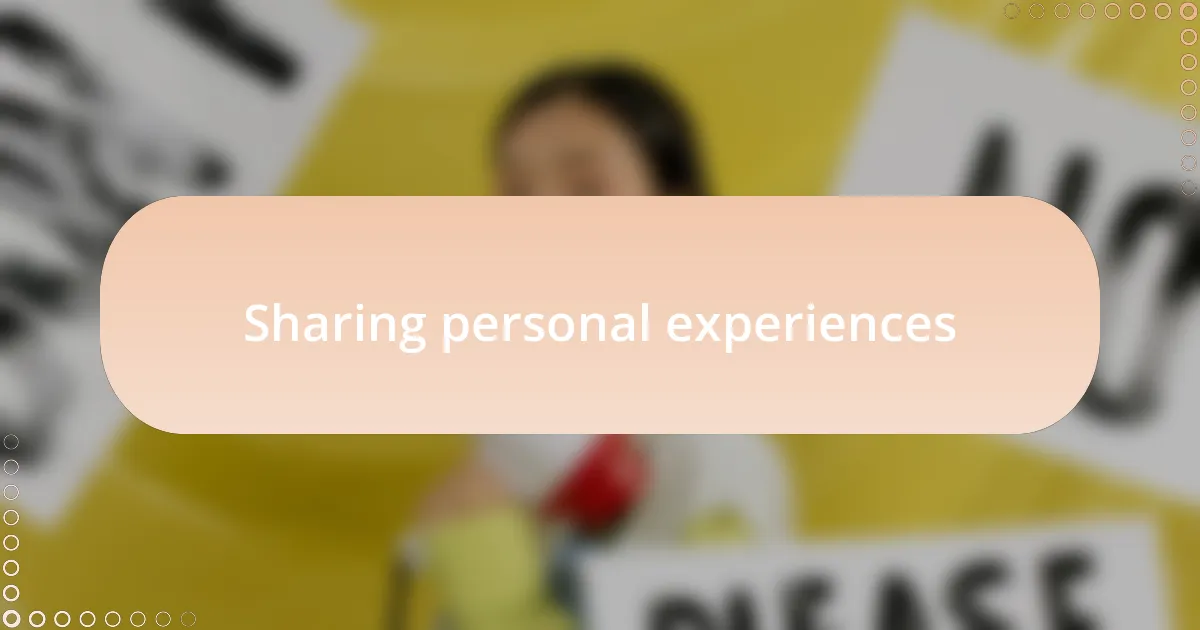
Sharing personal experiences
Sharing personal experiences can be a powerful tool in difficult conversations. I remember a time when I decided to share my trip to a war-torn region with others during a discussion about military interventions. I recounted the palpable fear I witnessed in the eyes of families who had lost everything. It struck me how that vulnerability invited others to share their experiences, creating a deeper connection among us.
One evening, while discussing the impact of repeated violence in the news, I took a moment to describe how I struggled to sleep after watching a particularly harrowing report. My confession seemed to resonate with a fellow participant, who expressed similar feelings. This mutual understanding not only made the dialogue feel safe but also encouraged others to reflect on their emotional reactions. Have you ever noticed how a raw, honest moment can shift the entire tone of a conversation?
I’ve come to see sharing these personal narratives as a way to humanize our discussions. I once spoke about my uncertainty while advocating for peace, telling others about a moment when I felt powerless to effect change. That honesty sparked a discussion where people began sharing their doubts and fears too. Isn’t it interesting how revealing our struggles can break down barriers and foster a space where everyone feels heard?
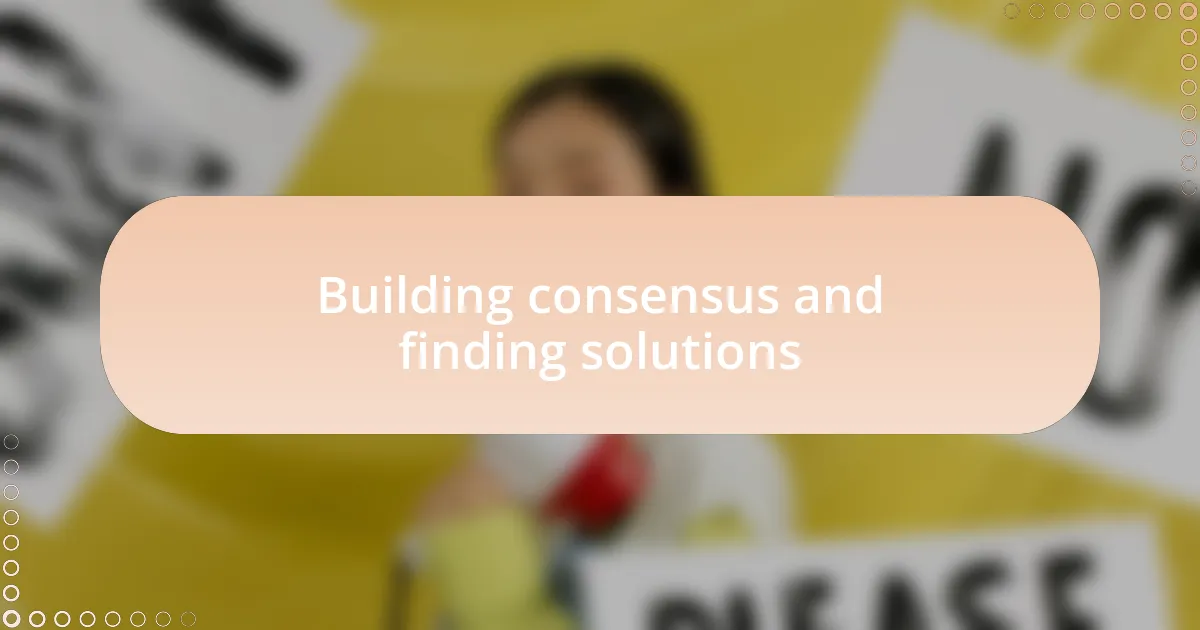
Building consensus and finding solutions
Building consensus often means recognizing common ground amidst differing opinions. I recall a community meeting where participants were divided on military aid proposals. Instead of arguing for my point, I asked everyone what they valued most in this situation. Surprisingly, many voiced a desire for peace and stability, which led us to explore collaborative solutions that honored those shared values.
During another discussion about anti-war strategies, a fellow activist shared a story about feeling overwhelmed by media narratives. I encouraged him to think about how these narratives could shape public perception. By brainstorming together, we identified ways to reframe our message and focus on peacebuilding initiatives that resonated more with our audiences. Have you ever realized that sometimes, the best solutions emerge through simple dialogues with a focus on understanding?
It’s essential to approach conversations with an open heart and a willingness to listen. I remember participating in a workshop where different viewpoints clashed. Instead of retreating into our corners, we took a moment to reflect on our shared humanity. This shift in perspective allowed us to craft solutions that, while imperfect, felt like joint victories—a reminder that compromise can sometimes lead to a stronger resolve for lasting change.